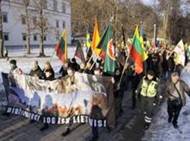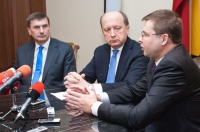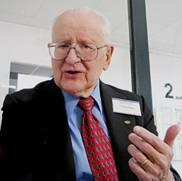
THE VOICE OF INTERNATIONAL LITHUANIA
|
VilNews has its own Google archive! Type a word in the above search box to find any article.
You can also follow us on Facebook. We have two different pages. Click to open and join.
|
Archive for March, 2012
- Posted by - (0) Comment
VilNews is like manna from heaven…

Just want you to know what a great thing VilNews is.. like manna from heaven...it’s the first thing I go to with my morning coffee..
Richard Vitkauskas
New York
- Bookmark :
- Digg
- del.icio.us
- Stumbleupon
- Redit it
![]()

Wish to commend you on the outstanding work that you do in bringing us, amazingly interesting articles on such a variety of subjects, together with photographic masterpieces....am now more and more interested in the history of my Fatherland, which I was blessed to visit in 2009 for my first visit and to walk in the footsteps of my ancestors.
My heartfelt thanks to you for your interest and dedication..
Aldona Martin (Martusevicius)
Australia
- Bookmark :
- Digg
- del.icio.us
- Stumbleupon
- Redit it
- Posted by - (0) Comment
COMMENTS TO OUR LAST WEEK ARTICLE:
“11 March marks the
restoration of
Lithuania's
independence – how
can the authorities
allow neo-Nazis to
dominate this important
day for the nation?”

Neo-Nazis marching in Vilnius
11 March 2010.
Click HERE to read the article
_____________________________
How about a “turn your back in shame” campaign?

Richard Vitkauskas
New York
PS:
Just want you to know also what a great thing VilNews is.. like manna from heaven...it’s the first thing I go to with my morning coffee..
_____________________________
Please read the link, share it, and sign the petition

Arthur Hessel
Washington D.C.
_____________________________
I strongly protest granting neo-Nazis a permit to exploit Lithuanian Independence Day

Dr. Boris Vytautas Bakunas, PhD
Chicago
_____________________________
I object

But I strongly object to her inaccurate, inflammatory statements like “...murder of about 95% of Lithuania’s Jewry during the Holocaust, largely by local collaborators...” Her claim is not supported by facts. Murdering largely was done by German SS and Gestapo.
My father was a short-lived mayor of Palanga, and when he openly objected to German inhumanity, he was removed at gunpoint from his position.
I was an 11 year old boy and I saw with my own eyes a group of Palanga’s Jews being led on the street to their death by uniformed Germans and not by any local “collaborators”.
Vytautas Sliupas
California
_____________________________
Response to Mr. Sliupas

I would like to assure Mr. Sliupas that I do not cite facts or figures irresponsibly. I base my statements on the research findings of respected historians (Timothy Snyder, Dina Porat, to name just a few).
To address Mr. Sliupas’s assertion that “ Murdering largely was done by German SS and Gestapo,” let me refer to some events in Palanga. According to the Lithuanian Holocaust Atlas, published in Vilnius in 2011, the mass murder of 111 Palanga Jews on June 27, 1941 was indeed carried out by German units. That mass grave is at Vytauto Street (p. 94).
The mass murders of two to three hundred Palanga Jews carried out in Kunigiskiai between June 26th and October 12th was led by district police chief of Kretinga P. Jakys (Lukys) and the city police chief of Palanga J. Adomaitis in cooperation with German forces (p. 95). Please refer to the links below:
http://holocaustatlas.lt/EN/#a_atlas/search/bendri=PALANGA.vietove=.aukos=.from_year=0.from_month=0.from_day=.to_year=0.to_month=0.to_day=.killers=/page/1/item/71
http://holocaustatlas.lt/EN/#a_atlas/search/bendri=PALANGA.vietove=.aukos=.from_year=0.from_month=0.from_day=.to_year=0.to_month=0.to_day=.killers=/page/1/item/72/
While great credit is due to Vytautas Sliupas's father, there is no use being in denial about the massive level of collaboration and participation. A recent oral history project includes survivor memories of the Lithuanian "rebel" forces' actions toward the Jews as soon as war broke out in Palanga:
http://www.youtube.com/watch?v=34RxJtf02gU&feature=channel_video_title (in Yiddish with summary in English in the description box)
Olga Zabludoff
Washington, DC
- Bookmark :
- Digg
- del.icio.us
- Stumbleupon
- Redit it
- Posted by - (0) Comment
The date 11 March will forever remain very
significant for both Japan and Lithuania
Japan mourning
2011 tsunami, Lithuania
marking 1990 freedom

A devastating earthquake and tsunami on 11 March 2011 made Japan shake to its core. Thousands of people perished. In addition to massive property damage, the Fukushima nuclear power station sustained critical damage to its reactors which, in turn, caused reactor melt downs and uncontrolled releases of radiation/radioactive materials.
11 March is a date that will forever remain significant in both Japan and Lithuania. It was on this date in 1990 that the members of the Lithuanian Parliament signed the Act of Independence, which was the first major step towards the country's liberation from the Soviet Union after 50 years of living under occupation.
And it was on this date in 2011 that a large earthquake and subsequent tsunami hit northern Japan in a most dramatic, damaging way. One of Japan's nuclear power plants was hit hard, with the result that radiation devastated a large area and many people’s lives.
Only two of Japan's 54 reactors are now running while those shut down for regular inspections undergo special tests to check their ability to withstand similar disasters.
In the midst of all this, Japan and Lithuania have signed an agreement on nuclear cooperation, as the industrial giant Hitachi has been selected to build a brand new nuclear power plant in Lithuania, expected ready by 2020. While the meltdown crisis in Fukushima has raised awareness around the world of the dangers of nuclear power, Lithuania, with its limited natural resources, appears to have little choice but to rely on atomic energy to reduce its heavy reliance on natural gas from Russia.
- Bookmark :
- Digg
- del.icio.us
- Stumbleupon
- Redit it
- Posted by - (1) Comment
The date 11 March will forever remain very
significant for both Japan and Lithuania
Japan mourning
2011 tsunami, Lithuania
marking 1990 freedom

A devastating earthquake and tsunami on 11 March 2011 made Japan shake to its core. Thousands of people perished. In addition to massive property damage, the Fukushima nuclear power station sustained critical damage to its reactors which, in turn, caused reactor melt downs and uncontrolled releases of radiation/radioactive materials.
11 March is a date that will forever remain significant in both Japan and Lithuania. It was on this date in 1990 that the members of the Lithuanian Parliament signed the Act of Independence, which was the first major step towards the country's liberation from the Soviet Union after 50 years of living under occupation.
And it was on this date in 2011 that a large earthquake and subsequent tsunami hit northern Japan in a most dramatic, damaging way. One of Japan's nuclear power plants was hit hard, with the result that radiation devastated a large area and many people’s lives.
Only two of Japan's 54 reactors are now running while those shut down for regular inspections undergo special tests to check their ability to withstand similar disasters.
In the midst of all this, Japan and Lithuania have signed an agreement on nuclear cooperation, as the industrial giant Hitachi has been selected to build a brand new nuclear power plant in Lithuania, expected ready by 2020. While the meltdown crisis in Fukushima has raised awareness around the world of the dangers of nuclear power, Lithuania, with its limited natural resources, appears to have little choice but to rely on atomic energy to reduce its heavy reliance on natural gas from Russia.
Japan today – 11 March 2012
Through silence and prayers, people across Japan on Sunday remembered the massive earthquake and tsunami that struck the nation one year ago, killing just over 19,000 people and unleashing the world's worst nuclear crisis in a quarter century.
A moment of silence was observed at 2:46 p.m. -- the exact time the magnitude-9.0 quake struck on March 11, 2011.
In the devastated northeastern coastal town of Rikuzentakata, a siren sounded and a Buddhist priest in a purple robe rang a huge bell at a damaged temple overlooking a barren area where houses once stood.
At the same time in Tokyo's National Theater, Emperor Akihito, Empress Michiko and Prime Minister Yoshihiko Noda stood in silence with hundreds of other people dressed in black at a memorial service.
An anti-nuclear protest took place in downtown Tokyo on Sunday amid growing public opposition to atomic power in the wake of the disaster, the worst since Chernobyl in 1986.
The quake was the strongest recorded in Japan's history, and set off a tsunami that towered more than 20 meters (65 feet) in some spots along the northeastern coast, destroying tens of thousands of homes and wreaking widespread destruction.
Today, some 325,000 people rendered homeless remain in temporary housing. While much of the debris has been gathered into massive piles, very little rebuilding has begun.
The government says the damaged Fukushima Dai-ichi nuclear plant, where three reactor cores melted down after the tsunami knocked out their vital cooling systems, is stable and that radiation coming from the plant has subsided significantly. But the plant's chief acknowledged to journalists visiting the complex recently that it remains in a fragile state, and makeshift equipment — some mended with tape — could be seen keeping crucial systems running.
Only two of Japan's 54 reactors are now running while those shut down for regular inspections undergo special tests to check their ability to withstand similar disasters. They could all go offline by the end of April if none are restarted before then.
The Japanese government has pledged to reduce reliance on nuclear power, which supplied about 30 percent of the nation's energy needs before the disaster, but says it needs to restart some nuclear plants to meet Japan's energy needs during the transition period.
Japan's prime minister has acknowledged failures in the government's response to the disaster, being too slow in relaying key information and believing too much in "a myth of safety" about nuclear power.
"We can no longer make the excuse that what was unpredictable and outside our imagination has happened," Prime Minister Yoshihiko Noda told a group of reporters last weekend. "Crisis management requires us to imagine what may be outside our imagination."
Lithuania today – 11 March 2012
Lithuania was today celebrating the 22nd anniversary of declaring independence from the former Soviet Union, the first of the iron-curtain states so to do after Lithuania had been swallowed up by Moscow in 1940 under the Molotov-Ribbentrop pact between Nazi Germany and the Soviet Union. Many believe Lithuania’s declaration helped accelerate the fall of the Soviet regime itself.
Professor Vytautas Landsbergis, Chairman of Lithuania’s Supreme Council, was the one who proclaimed Lithuania independent late evening on the 11th of March 1990. 124 members of the Supreme Council had voted for the breakaway. Nobody voted against.
Despite the reformist moves by Mikhail Gorbachev in Moscow, Lithuania’s decision angered the Soviet leadership. In January ’91, the tensions spilled over. Soviet tanks killed 14 people in clashes at the TV tower in Vilnius.
But later that year in the Soviet Union hardliners failed to overthrow Gorbachev, and the movement towards democracy gained momentum.
By early 1993, the Soviet tanks were beating a retreat. The international community had recognised Lithuania’s independence.
11 March has since 1990 been celebrated as Lithuania's second national day, after 16 February which marks the country's declaration of independence of 1918. Unfortunately, the country's authorities have for several years allowed neo-Nazi elements make their mark on this important freedom day.
This year's celebration was different in a positive way, seeing thousands of freedom-loving and open-minded people filling up the country's main street, Gedimino Avenue in Vilnius, to a worthy demonstration of the fact that Lithuania is again a land of wisdom and maturity.
- Bookmark :
- Digg
- del.icio.us
- Stumbleupon
- Redit it
- Posted by - (0) Comment

Lithuania’s nuclear path

Nuclear partnership: Masaharu Hanyu, vice president and executive officer of Hitachi Ltd. (left), and Zygimantas Vaiciunas, head of Lithuania's concession tender commission and the vice minister of energy, sign a tentative concession treaty in December 2011. HITACHI LTD.
By HIROKO NAKATA
Staff writer
While the meltdown crisis in Fukushima has raised awareness around the world of the dangers of nuclear power, Lithuania, with its limited natural resources, appears to have little choice but to rely on atomic energy to reduce its heavy reliance on natural gas from Russia.
"We now import about 70 percent of electricity from other countries to Lithuania," Lithuanian Prime Minister Andrius Kubilius said in a recent interview in Tokyo. "We do not have oil resources, gas resources and coal (resources). So for us, nuclear energy is an obvious choice."
Lithuania plans to build a nuclear plant in Visaginas by 2020 and reached in December a tentative agreement on the construction with Hitachi Ltd. and its Hitachi-GE Nuclear Energy Ltd. unit.
- Bookmark :
- Digg
- del.icio.us
- Stumbleupon
- Redit it
- Posted by - (1) Comment

Lithuania’s nuclear path

Nuclear partnership: Masaharu Hanyu, vice president and executive officer of Hitachi Ltd. (left), and Zygimantas Vaiciunas, head of Lithuania's concession tender commission and the vice minister of energy, sign a tentative concession treaty in December 2011. HITACHI LTD.
By HIROKO NAKATA
Staff writer
While the meltdown crisis in Fukushima has raised awareness around the world of the dangers of nuclear power, Lithuania, with its limited natural resources, appears to have little choice but to rely on atomic energy to reduce its heavy reliance on natural gas from Russia.
"We now import about 70 percent of electricity from other countries to Lithuania," Lithuanian Prime Minister Andrius Kubilius said in a recent interview in Tokyo. "We do not have oil resources, gas resources and coal (resources). So for us, nuclear energy is an obvious choice."
Lithuania plans to build a nuclear plant in Visaginas by 2020 and reached in December a tentative agreement on the construction with Hitachi Ltd. and its Hitachi-GE Nuclear Energy Ltd. unit.
The prime minister was recently in Japan on a five-day visit to meet Hitachi officials as well as members of Japan's business community.
Speaking about the March 11 disasters, he said that Lithuania was "deeply touched" by the disaster and tragedy suffered by the Japanese people.
In 2009, the Baltic state shut down its Ignalina nuclear power plant, one of Europe's largest, which was built in the Soviet era. The European Union required the closure of the plant's two reactors, which were similar in design to those at the Chernobyl power plant, as a condition of entry into the EU.
Since the closure, power costs have reportedly risen by as much as 20 percent.
Asked if the Fukushima crisis affected Lithuania's plan to build a new nuclear power plant, the prime minister said: "Of course, the natural disaster puts additional requests on the safety of technologies."
Kubilius also said the country aims to generate 20 to 25 percent of its electricity through wind power, biomass and other renewables in the future.
"But in Europe, only a few countries decided to stop development of nuclear projects. Quite many countries, especially in our Baltic region, are continuing development of nuclear projects," he said, citing Sweden, Finland and Poland, in addition to Lithuania and the two other Baltic states as examples.
Kubilius said any success Hitachi has in building the Visaginas nuclear plant will only help the Japanese heavy machinery maker win more tenders for other nuclear projects in these European countries.
Kubilius said he is sure Hitachi will pass its advanced technology standards on to Europe.
With the concession agreement tentatively signed in December, the prime minister said his government hopes the official signing will come in a couple of months. The Lithuanian government also hopes all necessary approval procedures will be completed by midyear.
How much Hitachi invests is still under negotiation, he said. Other investors include Lithuania, Latvia, Estonia and possibly Poland, he said.
He also stressed the strong support of nuclear power among the Lithuanian people.
"In general, more than 60 percent of Lithuanians are in favor of nuclear energy. In the local town of Visaginas, 90 percent of people are in favor of nuclear energy," he said. "For us, nuclear energy brings real energy independence."
- Bookmark :
- Digg
- del.icio.us
- Stumbleupon
- Redit it
- Posted by - (0) Comment
Growing up in a
nuclear shadow

By Kristen Iversen
I GREW up in Arvada, Colorado, in the shadow of a nuclear bomb factory, so I read the just-released report on the Fukushima meltdown in Japan with special interest. Coinciding with the first anniversary of the Fukushima Daiichi disaster, the 400-page report details the extensive misinformation supplied to the public by the Tokyo Electric Power Company (Tepco) in collusion with Japanese officials.
The Japanese government’s failure to warn citizens about radioactive danger put the entire city of Tokyo at health risk — and the rest of us as well. The report, which was written by an independent investigative panel established by the Rebuild Japan Initiative Foundation (published March 1 in the Bulletin of the Atomic Scientists), bluntly states that the much vaunted “absolute safety” of nuclear power is no more than a “twisted myth.”
The threat from nuclear power plants is twofold: grand scale catastrophe and continuing health problems connected with radioactive contamination in our air, water, soil and food supply — both short-term, high-level contamination and the long-term, low-level kind.
- Bookmark :
- Digg
- del.icio.us
- Stumbleupon
- Redit it
Baltic Prime Ministers pledge nuclear support
- Posted by - (0) Comment
![]()

Baltic PMs converse
(Image: BFL/Tomo Lukšio)
The prime ministers of Estonia, Latvia and Lithuania have reaffirmed their commitment to build a new nuclear power plant serving the Baltic states and have promised to work together to make sure progress is maintained.
Prime ministers Andrus Ansip (Estonia), Valdis Dombrovskis (Latvia) and Andrius Kubilius (Lithuania) confirmed their support for the construction of the Visaginas plant at a two-day meeting in Prienai, Lithuania.
The meeting was also attended by representatives from Hitachi-GE, the strategic investor in the project, and from the European Commission.
The prime ministerial trio formally welcomed progress since their last gathering in November 2011, and went on to reaffirm their support for Visaginas "for the security of power supply in our countries" and for the three energy companies involved in the project – Eesti Energia, Latvenergo and Visagino Atominė Elektrinė (VAE).
The ministers said they would be encouraging the companies to finalise negotiations in a "timely manner" to ensure that the next milestone for the project - approval of a nuclear plant concession agreement by the Lithuanian parliament - is met by June 2012.
Two Soviet-era RBMK nuclear reactors at Ignalina in Lithuania were forced to close as a condition of Lithuania's accession to the European Union, leaving the region heavily dependent on electricity imports. The planned new Visaginas plant would give the countries the chance to diversify their energy portfolio and ensure greater energy security: at present Lithuania imports almost 90% of its gas from Russia.
- Bookmark :
- Digg
- del.icio.us
- Stumbleupon
- Redit it
![]()

Sveinung Stohle,
President and Chief Executive
of Hoegh LNG
* Norway's Hoegh LNG signs deal to supply FSRU to Lithuania
* LNG supply tender expected in Q2 2012
* LNG imports to end Gazprom's monopoly, put pressure on prices
Norwegian LNG service company Hoegh LNG on Friday signed a deal to supply a floating LNG import platform to Lithuania, in a move that will cut the Baltic country's dependence on gas imports from Russia.
The deal includes the 10-year lease and operation of a 170,000 cubic meters floating storage and regasification vessel (FSRU) with Lithuania's majority state-owned terminal Klaipedos Nafta at a cost of $156,200 per day.
"This is a market price... It's a fair deal for us and for Klaipedos Nafta," Sveinung Stohle, President and Chief Executive of Hoegh LNG, who signed the deal, told journalists in Vilnius.
LNG deliveries will end Gazprom's supply monopoly in the Baltic state

Energy Minister
Arvydas Sekmokas
The country's Energy Minister Arvydas Sekmokas hailed the deal as "prehaps the greatest achievement" in the energy sector since the Baltic state built the floating Butinge oil terminal in 1999.
When Russia cut oil supplies via pipeline in 2006, the country's refiner, now a part of Poland's PKN Orlen, was able to switch to sea crude deliveries.
"Russia Gazprom's excessively high gas prices forced us to develop this LNG terminal, which would help to assure security of supply... and to create a gas market," Sekmokas told journalists.
"That should help to cut gas prices... Today we have no leverage on Gazprom's prices," he added.
- Bookmark :
- Digg
- del.icio.us
- Stumbleupon
- Redit it
- Posted by - (2) Comment
UŽUPIS SPRING 2012
Slide show with music. Full screeen recommended!
Photos: Aage Myhre
Director: Cassandra Myhre
Music: Music: Sergey Kuryokhin –
Morning Exercises in the Nuthouse
Užupis is a neighbourhood located in the outskirts of Vilnius’ Old Town. Užupis means “on the other side of the river” in Lithuanian language and refers to the Vilnia River. The name Vilnius was derived from the Vilnia. Užupis is popular with artists, and has been compared to Montmartre in Paris due to its bohemian atmosphere. The district houses art galleries, artists’ workshops, and cafés. On April Fools Day in 1997, the district declared itself an independent republic (The Republic of Užupis), replete with an army of 12 personnel. Užupis is largely characterized by dilapidated buildings, courtyards and cobblestone streets that haven‘t been renovated for decades. But when the music reverberates over the cobbles in the late evenings you will certainly fall in love with this unique part of Vilnius. The atmosphere – filled with love, music, smells and happy people – will certainly catch your soul…
- Bookmark :
- Digg
- del.icio.us
- Stumbleupon
- Redit it
- Posted by - (1) Comment
Gedimino pr. Sunday 11 March at 16.00:
Let’s meet to celebrate
freedom & tolerance!

Sunday 11th of March it is 22 years since the members of the Lithuanian Parliament signed the State of Lithuania's independence declaration. At the risk of their own lives, these brave men and women put their signatures on a paper that clearly stated that they and the Lithuanian people would no longer accept to live under occupation and oppression.
Lithuania became a free and democratic country as a result of these signatures, and even if the country’s development since then has not been perfect, it is still reason to celebrate the freedom and clearly demonstrate that we value living in a free Lithuania where the concepts of tolerance, democracy, openness, respect and compassion are the ideals.
So bring your family and friends to Gedmino Avenue in Vilnius on Sunday 11 March at 16:00 and let us together celebrate unity, equality, openness and friendship. Only this kind of patriotism provides for the existence of a democratic state and civil society. Independence Day is what unites us, so let’s celebrate it together. Free, friendly and fearless!
The initiative is called CELEBRATING FREEDOM. Its goal is to bring together all Lithuanians who cherish the values enshrined in the Constitution – a democratic system, rule of law, equality, openness, respect for everyone, and to enjoy Lithuanian independence.
On March 11th, let us celebrate unity, equality, openness and friendship. Only this kind of patriotism provides for the existence of a democratic state and civil society. Independence Day is what unites us, and so, let’s celebrate it together. Free, friendly and fearless!
PROGRAMME:
16:00 Participants meet on Gedimino Avenue between Kudirkos Square and Independence Square. At the Entertainment Islands on Gedimino Avenue we listen to Amberlife, Skyders and other musicians, sew a Lithuanian flag with students, break dance, observe performances/dances by professional artists, beat African drums and enjoy tea and coffee (please see the map below for exact locations).
16:30 We march from Independence Square in the direction of the Music Academy with Nomeda Marcenaite and from Kudirkos Square towards the Music Academy with Arnoldas Lukosius. Join the march wherever you are.
17:00 We will open the windows of the Music and Art Academy and dance together with DJ Mark Splinter, Tomas Boo, Swix and Vaiper Despotin. The march will end by singing our national anthem, together with maestro Vytautas Juozapaitis
18:00 Conclusion of the Freedom Celebration!
We will celebrate with:
Nomeda Marčėnaitė, Vytautas Juozapaitis, Vladimiras Laučius, Artūras Račas, Diana Vilytė, Darius Kuolys, Dana Migaliova, Saulius Arvasevičius, Leonidas Donskis, Arūnas Pemkus, Monika Garbačiauskaitė-Budrienė, Rytis Juozapavičius, Algis Ramanauskas-Greitai, Dominykas Vaitiekūnas, Dainius Pūras, Ričardas Berankis, Ilja Laurs, Markas Zingeris, Jonas Ohman, Amberlife, Jurgis ir Erica Didžiuliai, Petras Geniušas, Vytautas V. Landsbergis, Giedrė Kilčiauskienė ir Empti, Gintarė Latvėnaitė, Robertas Povilaitis, Gabrielė Tuminaitė, DJ Mark Splinter, Tomas Boo, Skyders with Tomas Šileika, break-dance group from club „i17“, Schools Parliament, Student Association and others.

- Bookmark :
- Digg
- del.icio.us
- Stumbleupon
- Redit it
- Posted by - (0) Comment
Gedimino pr. Sunday 11 March at 16.00:
Let’s meet to celebrate
freedom & tolerance!

Sunday 11th of March it is 22 years since the members of the Lithuanian Parliament signed the State of Lithuania's independence declaration. At the risk of their own lives, these brave men and women put their signatures on a paper that clearly stated that they and the Lithuanian people would no longer accept to live under occupation and oppression.
Lithuania became a free and democratic country as a result of these signatures, and even if the country’s development since then has not been perfect, it is still reason to celebrate the freedom and clearly demonstrate that we value living in a free Lithuania where the concepts of tolerance, democracy, openness, respect and compassion are the ideals.
So bring your family and friends to Gedmino Avenue in Vilnius on Sunday 11 March at 16:00 and let us together celebrate unity, equality, openness and friendship. Only this kind of patriotism provides for the existence of a democratic state and civil society. Independence Day is what unites us, so let’s celebrate it together. Free, friendly and fearless!

- Bookmark :
- Digg
- del.icio.us
- Stumbleupon
- Redit it
- Posted by - (0) Comment
March 11th marks the 22nd anniversary of the historic signing of the Act of the Re-Establishment
of the State of Lithuania
There are many brave men and women to thank

Signatories celebrating in the Seimas (Parliament) the night of March 11, 1990
The signing of this Act put an end to fifty years of brutal repression and occupation by Soviet Russia.
There are many brave men and women to thank for their valiant work that ultimately made this possible.
While the members of Sąjūdis, the Lithuanian Liberty League and the signatories of the Act are often the ones we think of first we also know that it was the people of Lithuania and many Lithuanians around the world whose work and support also made this historic event happen.
We would like to share with you some of the key events leading up to and following Lithuania and Lithuanians declaring themselves once again a free and independent country and people but before we get into all the details we would just like to say something to all who made this possible March 11, 1990
AČIŪ JUMS
Su pagarbe Vincas Karnila, Associate editor
vin.karnila@VilNews.com
- Bookmark :
- Digg
- del.icio.us
- Stumbleupon
- Redit it
- Posted by - (1) Comment
March 11th marks the 22nd anniversary of the historic signing
of the Act of the Re-Establishment of the State of Lithuania
There are many brave men and
women to thank

Signatories celebrating in the Seimas (Parliament) the night of March 11, 1990
The signing of this Act put an end to fifty years of brutal repression and occupation by Soviet Russia.
There are many brave men and women to thank for their valiant work that ultimately made this possible.
While the members of Sąjūdis, the Lithuanian Liberty League and the signatories of the Act are often the ones we think of first we also know that it was the people of Lithuania and many Lithuanians around the world whose work and support also made this historic event happen.
We would like to share with you some of the key events leading up to and following Lithuania and Lithuanians declaring themselves once again a free and independent country and people but before we get into all the details we would just like to say something to all who made this possible March 11, 1990
AČIŪ JUMS
Su pagarbe Vincas Karnila, Associate editor
vin.karnila@VilNews.com
March 11, 1990
Act of the Re-Establishment of the State of Lithuania

The Act of the Re-Establishment of the State of Lithuania or Act of March 11 (Aktas dėl Lietuvos nepriklausomos valstybės atstatymo) was an independence declaration by the Lithuanian Soviet Socialist Republic adopted on March 11, 1990, signed by all members of the Supreme Soviet of the Lithuanian SSR. The act emphasized restoration and legal continuity of interwar period Lithuania, which lost its independence in June 1940 as a result of Soviet Russia’s invasion and resulting annexation and occupation. It was the first time that a Soviet Socialist Republic declared independence from the Soviet Union.
LOSS of INDEPENDENCE
After the partitions of the Polish–Lithuanian Commonwealth in the 18th century, Lithuania was under the control of the Russian Empire. In the aftermath of the Russian Revolution of 1917, the Council of Lithuania, chaired by Jonas Basanavičius, proclaimed the Act of Independence of Lithuania on February 16, 1918. Lithuania enjoyed independence for two decades. In August 1939, Soviet Russia and Nazi Germany signed the Molotov–Ribbentrop Pact dividing Eastern Europe into spheres of influence. The Baltic states, Lithuania, Latvia and Estonia, were assigned to Russia and subsequently were occupied in June 1940 and converted into soviet socialist republics. The Soviet authorities undertook Sovietization policies such as the nationalization of all private property, collectivization of agriculture, suppression of the Catholic Church, and imposition of totalitarian control. By 1953 the armed anti-Soviet partisans had been reduced to the point that they could no longer operate as an effective organized force and approximately 130,000 Lithuanians, dubbed "enemies of the people", had been forcibly deported into Siberia. After the death of Joseph Stalin in 1953, the Soviet Union adopted de-Stalinization policies and ended mass persecutions. Nonviolent resistance continued both in Lithuania and among Lithuanian Diaspora. These movements were conducted in secret as they were deemed illegal and focused more on social issues such as human rights and cultural affairs rather than political demands.
INDEPENDENCE MOVEMENTS
As Mikhail Gorbachev attempted to revive economy of the Soviet Union, he introduced glasnost (openness) and perestroika (restructuring). These reforms encouraged changes within the Soviet government and invited the public into discussions. For the activists, it was an opportunity to bring their movements from underground into the public life.

Map of the Eastern Bloc
As Mikhail Gorbachev attempted to revive economy of the Soviet Union, he introduced glasnost (openness) and perestroika (restructuring). These reforms encouraged changes within the Soviet government and invited the public into discussions. For the activists, it was an opportunity to bring their movements from underground into the public life. On August 23, 1987, the 48th anniversary of the Molotov–Ribbentrop Pact, the Lithuanian Liberty League organized the first public protest rally that did not result in arrests. In mid-1988, a group of 35 intellectuals organized the Sajūdis Reform Movement with the officially stated goal of supporting, discussing, and implementing Gorbachev's reforms. Sąjūdis grew in popularity, attracting large crowds to rallies in Vingis Park in Vilnius and radicalizing its agenda.



The Baltic Way August 23, 1989
Sąjūdis grew into a universal movement, with the citizens of Lithuania demanding that first economic and then political relations should be changed. The Constituent Assembly of Sąjūdis was held on October 22-23, 1988. The prospective objective - the independence of the Lithuanian economy and finally its political independence, so that Lithuania should not be bound to other countries by any obligations restricting its sovereignty, was discussed in the lobby and even in official speeches of the participants of the Assembly. The Sąjūdis Seimas was elected, and the historic name of the Lithuanian state power was brought back in this way. The Sąjūdis Council was formed, and on November 24, 1988, Vytautas Landsbergis, a musicologist, a specialist on creative work of M.K. Čiurlionis and a member of the initiative group of Sąjūdis was elected the Chairman of the Council.
Sąjūdis logo Lithuanian Communist Party (LCP)
The movement continuously pushed further with its demands. These demands included limited discussions on Gorbachev's reforms, greater say in economic decisions and political autonomy within the Soviet Union. By the time of the Baltic Way on August 23, 1989, which was a human chain made up of more than two million people spanning over 600 kilometers (370 mi) across the three Baltic states to mark the 50th anniversary of the Molotov–Ribbentrop Pact, full independence was the official goal.
DEMOCRATIC ELECTION
As the elections to the Supreme Council of February 1990 approached, two political forces took shape in Lithuania, Sąjūdis uniting the consistent supporter of independence and the independent Lithuanian Communist Party (LCP) that in 1989, during the mass protests of the Singing Revolution against Soviet Union in Lithuania, had declared itself independent from Communist Party of the Soviet Union. The essence of the Sąjūdis program was based on the historical link of the re-established Lithuanian State with the former Republic of Lithuania, which existed from 1918 to 1940. The Supreme Council, elected in universal, free and democratic elections, was to formalise this continuity in appropriate legal, political and historical acts. The LCP proclaimed a popular but abstract electoral slogan: "A Lithuania without sovereignty is a Lithuania without a future!"

Sąjūdis rally in Vingas Park, Vilnius 23 August 1988
The Parliamentary elections of February 1990 were the first free and democratic elections in Lithuania since World War II. The people overwhelmingly voted for the candidates endorsed by Sąjūdis, even though the movement did not run as a political party. Sąjūdis candidates received 96 out of 141 deputy mandates.

Vytautas Landsbergis
The result was the first post-war non-communist government. Among the first laws enacted by the Supreme Council was the Law on the Name and National Emblem which officially promulgated the country's name as the Republic of Lithuania and reintroduced the historic emblem depicting the mounted knight Vytis. At 10.44 p.m., March 11, 1990, the Supreme Council of the Republic of Lithuania adopted an Act embodying the expectations and hopes of the nation “On the Re-establishment of the Independence of the Republic of Lithuania” which solemnly proclaimed the end of the period of occupation by a foreign government and the beginning of a new era of statehood.
124 delegates voted in favor of the Act, 6 abstained and no votes were cast against the Act. The Act confirmed the continuous and unbroken link of the re-established Lithuanian State with the Act of Independence of February 16, 1918, and the Resolution of a democratic Lithuanian Government, passed by Constituent Assembly (Seimas) on May 15, 1920.

Vytis
With this Act the Council committed itself to carry out the functions of the highest authority, the Lithuanian Parliament, which expressed the will of the absolute majority of population. The Supreme Council terminated the validity of the Constitution of the USSR of October 7, 1977, and the Constitution of the Lithuanian SSR of April 20, 1978, declaring the nominal validity of the Constitution of May 12, 1938, within the territory of Lithuania. The Supreme Council announced that the Constitution of 1938 was in force. This fact signified the continuity of the rights of sovereignty of the Lithuanian State. However, to really regulate the life of the state the principal Provisional Law was passed shortly and the validity of the said Constitution was terminated.
The ACT
SUPREME COUNCIL OF THE REPUBLIC OF LITHUANIA ACT On the Re-establishment of the State of Lithuania The Supreme Council of the Republic of Lithuania, expressing the will of the nation, decrees and solemnly proclaims that the execution of the sovereign powers of the State of Lithuania abolished by foreign forces in 1940, is re-established, and henceforth Lithuania is again an independent state. The Act of Independence of February 16, 1918 of the Council of Lithuania and the Constituent Assembly decree of May 15, 1920 on the re-established democratic State of Lithuania never lost their legal effect and comprise the constitutional foundation of the State of Lithuania. The territory of Lithuania is whole and indivisible, and the constitution of no other State is valid on it. The State of Lithuania stresses its adherence to universally recognized principles of international law, recognizes the principle of inviolability of borders as formulated in the Final Act of the Conference on Security and Co-operation in Europe in Helsinki in 1975, and guarantees human, civil, and ethnic community rights. The Supreme Council of the Republic of Lithuania, expressing sovereign power, by this Act begins to realize the complete sovereignty of the state.
Watch the historic event of the night of 11 March 1990
1990 Kovo 11
http://youtu.be/D3kJY892Yi0
SIGNATARAI
(THE SIGNATORIES)
|
Aleksandras Algirdas ABIŠALA |
Česlovas JURŠĖNAS |
Vytautas Adolfas PUPLAUSKAS |
AFTERMATH
The Act of the Re-Establishment of the State of Lithuania served as a model and inspiration to other Soviet republics however the issue of independence was not immediately settled. While recognition by other countries was still not certain, the immediate response from the U.S.A. was very clear
|
The leadership of the USSR reacted to the re-establishment of the Lithuanian State with extreme antagonism. Mikhail Gorbachev called the Act of Independence illegal. The Congress of People's Deputies declared the Act of the re-establishment of the Lithuanian State "null and void", and President Gorbachev issued an ultimatum demanding that the sovereignty of the USSR be re-established on the territory of Lithuania and that the country abide by the provisions of the Soviet constitution. When Lithuania rejected the ungrounded and illegal demands of the foreign government, the USSR resorted to a policy of threats, blackmail and intimidation. Soviet military control over Lithuanian state borders was strengthen, foreign citizens' access to the country was limited, and the Soviet military units stationed in Lithuania behaved as they pleased.
Beginning with March 13, 1990, after the March 11th Act on the Re-establishment of an independent Lithuanian State was promulgated, the USSR started applying political and social sanctions against Lithuania. From April until June 1990, it imposed an economic blockade. Later, in order to break the will of the Lithuanian people, the government of the USSR began open military aggression. Unarmed Lithuanian citizens, encircling the strategically important objects including the Parliament buildings, guarded them day and night expecting to avoid aggression. In front of the Parliament buildings barricades were set up bearing different slogans and graffiti reflecting the chief aim of the defenders - To defend the re-established statehood of Lithuania. On January 13, 1991, using brutal force against the unarmed population, Soviet troops stormed the state television and radio buildings in Vilnius, 14 people were killed and about 600 civilians were injured. A wave of indignation rolling throughout the world and the determination of the Lithuanians to defend the Parliament of Lithuania stopped the atrocities of the aggressors.
During the days of barricades the Parliament was called "the heart of Lithuania", from 1990 till 1992, it was the political centre of the Lithuanian State. New legislation, which should decide economic and cultural growth of the Republic of Lithuania, as well as Lithuania's international recognition in the international community of states was related to the work of the Parliament. In other words, the objectives of the Supreme Council were similar to those of the Constituent Assembly (Seimas) of 1920. For this reason the Supreme Council later was given the name of the Reconstituent Seimas.
On account of those aggressive actions, on March 24 the Supreme Council (Reconstituent Seimas) adopted the decision to transfer its powers, in case its rights were restricted, to Stasys Lozoraitis the Independent Envoy of the Republic of Lithuania in Washington and at the Holy See. The United States of America were among the few countries which did not only refuse to recognise the occupation of the Republic of Lithuania and its annexation in 1940 but also allowed the Embassy of the Republic of Lithuania to function. On March 22, 1990, the Supreme Council (Reconstituent Seimas) passed the Law on the Government and the first Government of the re-established Lithuanian State was formed (the 22nd Cabinet of Ministers in the history of the Republic of Lithuania). On 24 March 1990, Kazimira Danutė Prunskiene was appointed Prime Minister of the Republic of Lithuania and during her visits abroad was received by US President G. Bush, Prime Minister of Great Britain M. Thatcher, President of France F. Mitterand, Chancellor of Germany H. Kohl.

Stasys Lozoraitis
Provocative actions of the Soviets lasted in fact until August 21, 1991, when the communist putsch in Moscow failed. After the failure of the putsch, Lithuania became fully independent of the USSR. The Soviet Socialist Republic of Moldova was the first from the USSR to recognise the independent Republic of Lithuanian on May 30, 1990 and this was the sign to the authorities in Moscow that the Soviet Empire was breaking up. On February 11, 1991, the Independent Republic of Lithuania was recognised by Iceland. Then recognition of Lithuania’s independence was quickly followed by several countries including Hungary, Bulgaria, Italy, Canada, Poland, Malta, San Marino, Portugal, Romania, Ukraine, Latvia and Estonia. On September 17, 1991, Lithuania joined the United Nations along with Estonia and Latvia. Lithuania also became a full member of a number of other international organisations. At the 86th Conference of the Inter-Parliamentary Union held on October 7, Lithuania became an IPU member. On January 24-26, 1992, the Secretariat of a new parliamentary organisation - the Baltic Assembly - was established. On 6 September 1992, the USSR recognised the Independence of Lithuania and on 8 September 1992, a treaty was signed with Russia in Moscow in which it was agreed that Russian troops would be pulled out from the territory of Lithuania by August 31, 1993.
We would like to thank the Honorable Vytautas Landsbergis. Much of the information came from his writings.
- Bookmark :
- Digg
- del.icio.us
- Stumbleupon
- Redit it
VilNews e-magazine is published in Vilnius, Lithuania. Editor-in-Chief: Mr. Aage Myhre. Inquires to the editors: editor@VilNews.com.
Code of Ethics: See Section 2 – about VilNews. VilNews is not responsible for content on external links/web pages.
HOW TO ADVERTISE IN VILNEWS.
All content is copyrighted © 2011. UAB ‘VilNews’.

 Click on the buttons to open and read each of VilNews' 18 sub-sections
Click on the buttons to open and read each of VilNews' 18 sub-sections 























.jpg)



